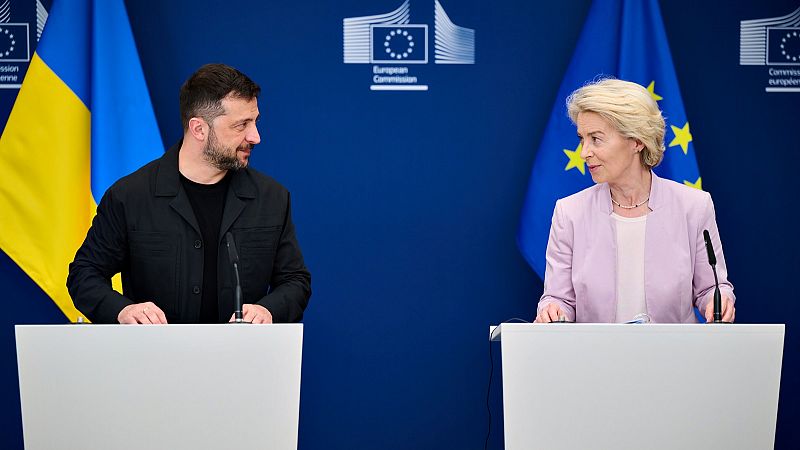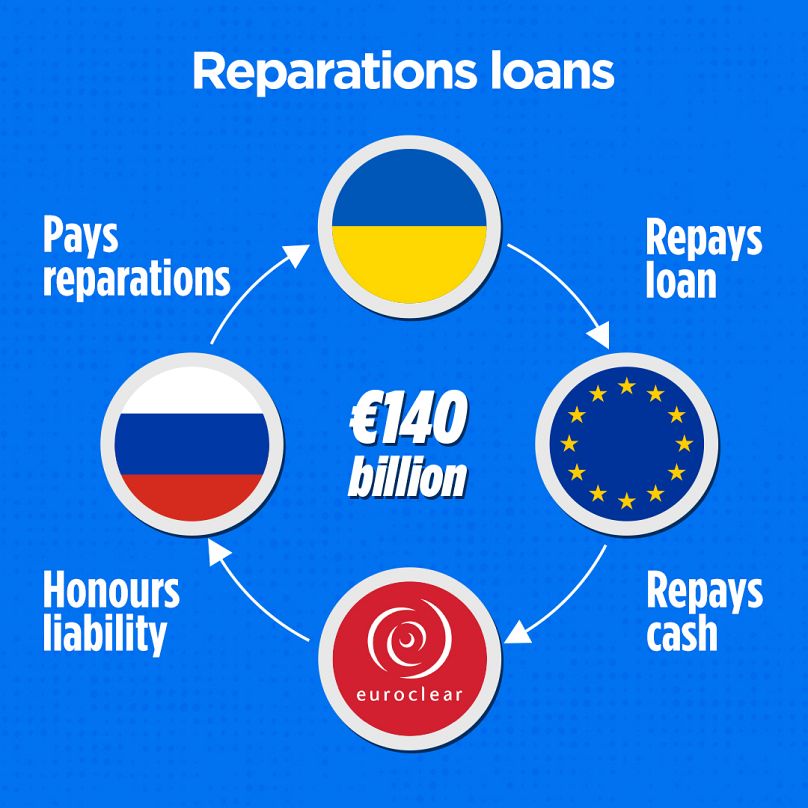Brussels pitches €140 billion loan for Ukraine using Russia's frozen assets

The European Commission has pitched a novel plan to leverage the frozen assets of the Russian Central Bank and issue an extraordinary €140 billion to Ukraine, which the country would repay only after Moscow covers the costs of the destruction.
The proposal for a so-called "Reparations Loan" was first previewed by Ursula von der Leyen earlier this month during her State of the EU speech as a way to continue assistance to Kyiv without further burdening cash-strapped member states.
"This is Russia's war. And it is Russia that should pay," the Commission president said. "It should not only be European taxpayers who bear the brunt."
The first details of the plan were presented in a short document circulated by the executive ahead of a meeting of EU ambassadors on Friday and seen by Euronews.
The structure envisioned by the Commission is highly complex and innovative.
It centres on Euroclear, a Brussels-based central securities depository that guards the vast majority of the Russian assets immobilised as part of the sanctions. The assets, which were initially held as bonds, have gradually turned into a cash pot worth €176 billion, with an additional €10 billion expected in the coming years.
"Russia has a claim for this account on Euroclear," the document states.
Under the plan, Euroclear would transfer the cash to the Commission, and the Commission would then use it to issue a zero-interest loan to Ukraine.
At the same time, the Commission would enter a "tailored debt contract" with Euroclear, which Euroclear would be compelled to invest to recoup the transferred cash.
The total amount of the loan would be €185 billion, but €45 billion would be used to back an already existing G7 credit based on the windfall profits of the assets. Since the cash would be transferred, the windfall profits would cease to be generated.
This would leave up to €140 billion for the "Reparations Loan", which would be disbursed in regular tranches and subject to conditions. The assistance could be used to cover budgetary, emergency and military needs.
As agreed by EU leaders, the assets would remain frozen until two conditions are met:
- Russia ceases its war of aggression
- Russia compensates Ukraine for the damage caused
The plan envisages that Ukraine would use the compensation provided by Russia to repay the loan issued by the Commission. Afterwards, the Commission would repay Euroclear, and Euroclear would repay Russia.
In other words, the scheme is designed as a pressure tool to ensure Moscow is held accountable for the havoc it has wreaked. But given the Kremlin's long-standing view, it is unlikely that the country will agree to foot the ever-increasing bill.
The C word
Brussels believes this construction would avoid the outright confiscation of the sovereign assets, which is forbidden under international law. However, the innovative interpretation applied to the proposal could nevertheless prompt legal questions and challenges.
"Critically, this whole operation would not touch the sovereign assets of Russia (...) and it would be temporary," the document says.
The transfer of money from Euroclear to the Commission would need to be guaranteed by the 27 member states to cover expenses if the sanctions were to be lifted earlier. Under current rules, sanctions must be renewed every six months and depend on unanimous consent, meaning one single country could derail the entire project.
As part of the plan, the Commission suggests activating Article 31.2 of the treaties to switch the prolongation from unanimity to a qualified majority. The article is based on the bloc's "strategic interests and objectives", which means Brussels could make a reasonable argument in favour. However, it also states that any country can oppose the switch for "vital and stated reasons of national policy".
A previous attempt to change the periodicity of sanctions renewal was blocked by Hungary, leaving the norm at six months.
Member states are still processing the Commission's plan, and negotiations are expected to stretch weeks, if not months, given its magnitude.
German Chancellor Friedrich Merz has already expressed his support for the €140 billion, noting it should be used exclusively to procure military equipment.
"We must massively raise the costs of Russia's aggression," Merz said on a series of social media messages published on Thursday.
"We should also invite partners around the world that have frozen Russian assets to join the instrument. To this end, we will coordinate closely with our partners in the G7."
Notably, Merz used the term confiscation to describe the operation. The word is completely absent in the Commission's document.
In a recent interview with CBS News, French President Emmanuel Macron came out strongly against the prospect of confiscation, calling it a "matter of credibility".
"We will respect international law," Macron said. "We are predictable, and we will not do all impossible things with these frozen assets."
In a statement, a Euroclear spokesperson urged risks to be "adequately mitigated".
"It will be necessary that any action or agreement avoids undermining confidence in international financial markets by safeguarding the legal order and legal certainty which underpin global economies, such as the principles of sovereign immunity and the protection of ownership rights," the spokesperson told Euronews.
The latest move from Brussels coincides with a drastic U-turn by US President Donald Trump, who said that "Ukraine, with the support of the European Union, is in a position to fight and win all of Ukraine back in its original form."
This article has been updated to clarify the use of Article 31.
Yesterday


